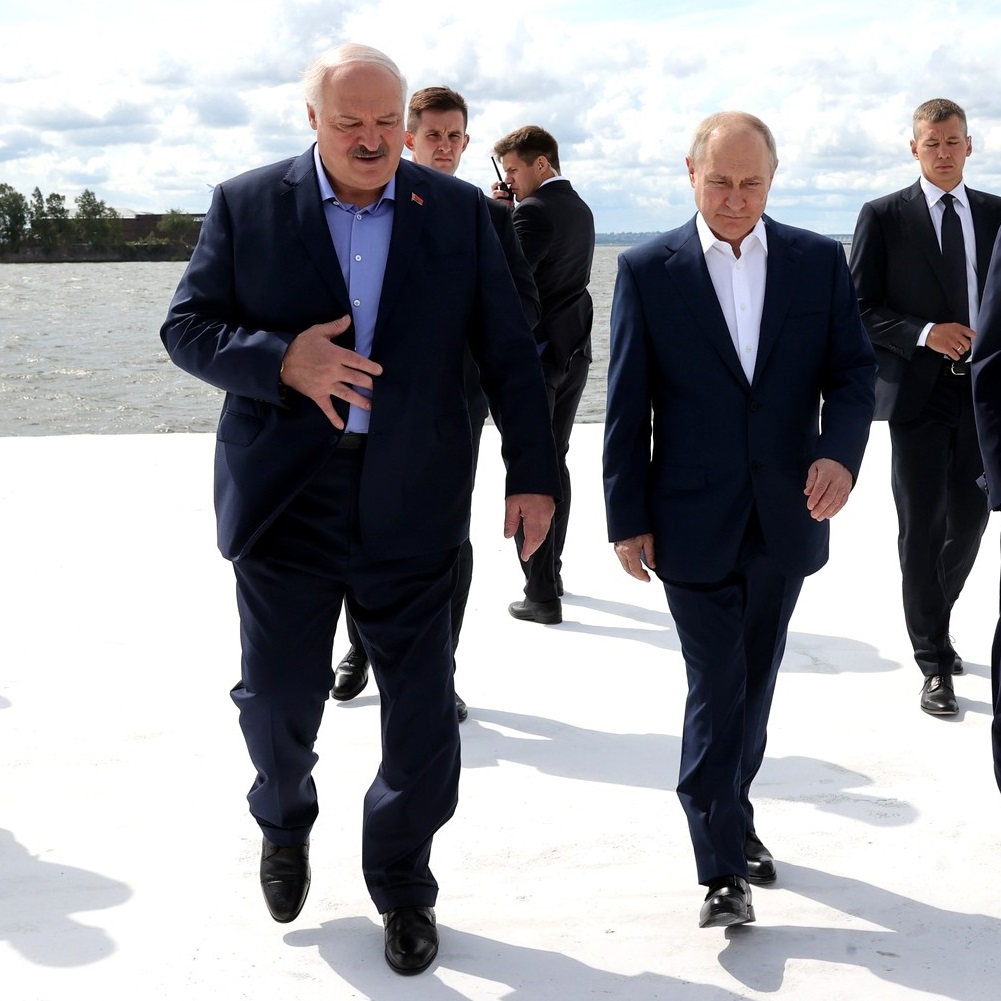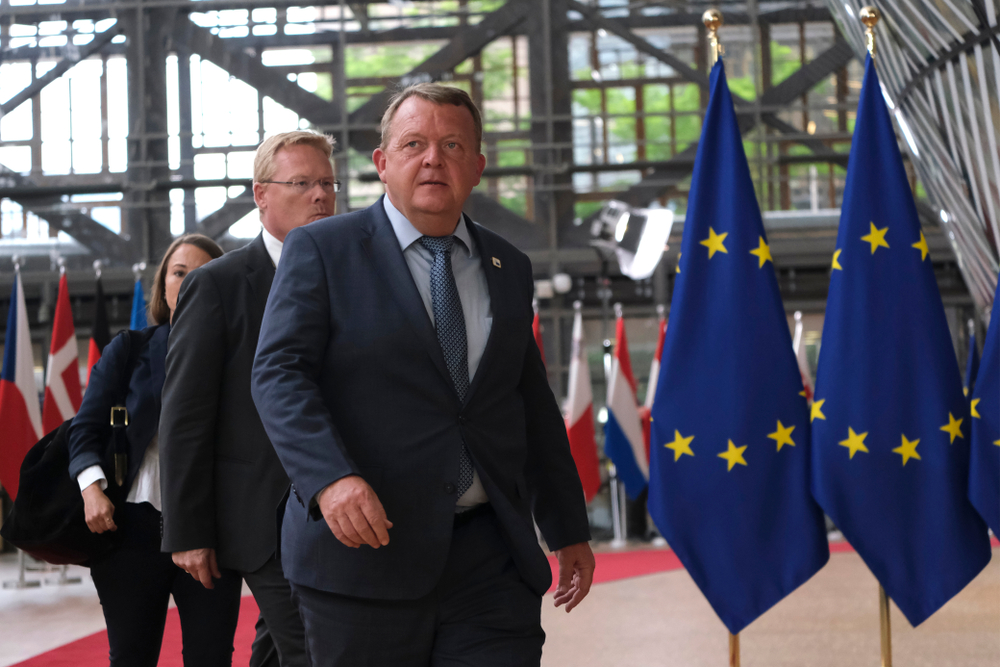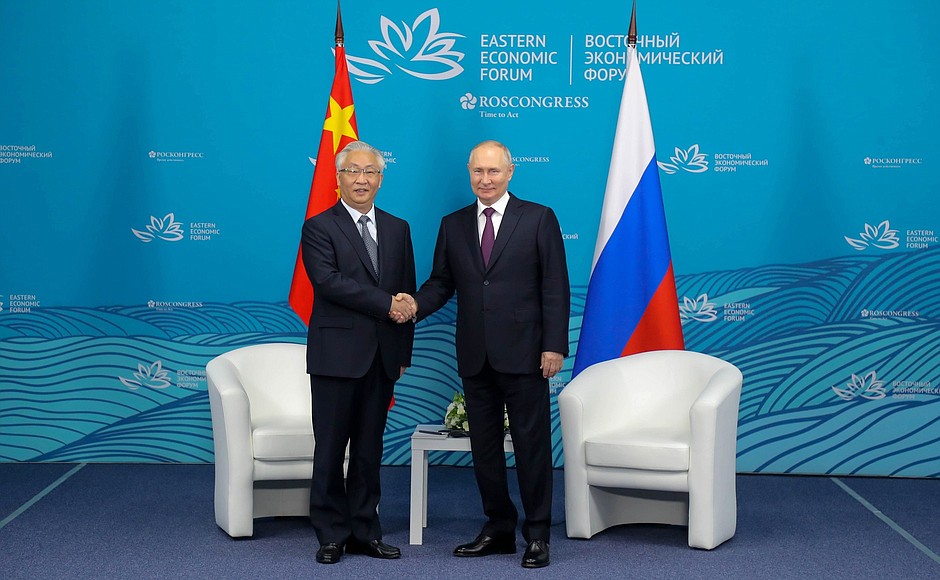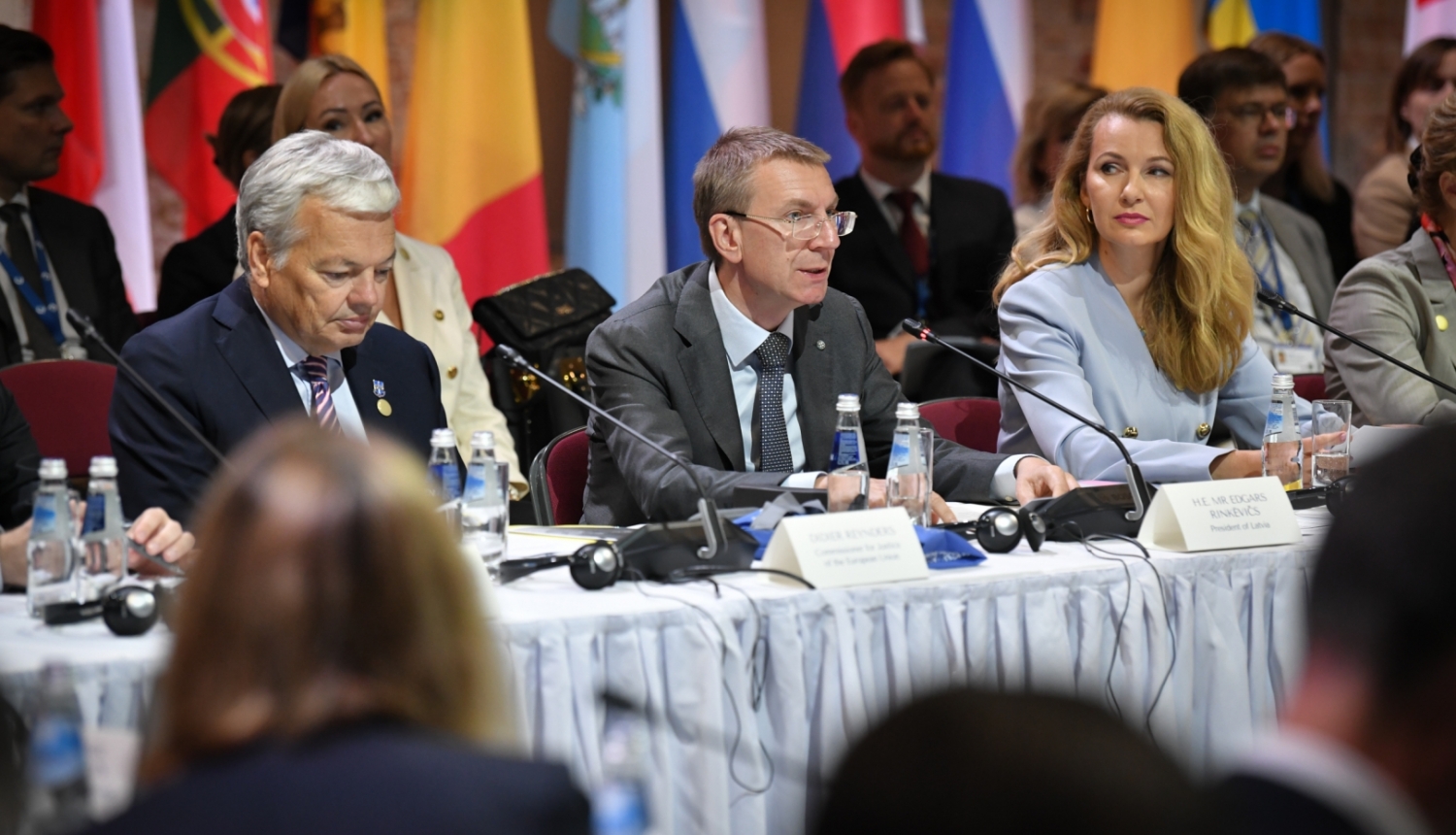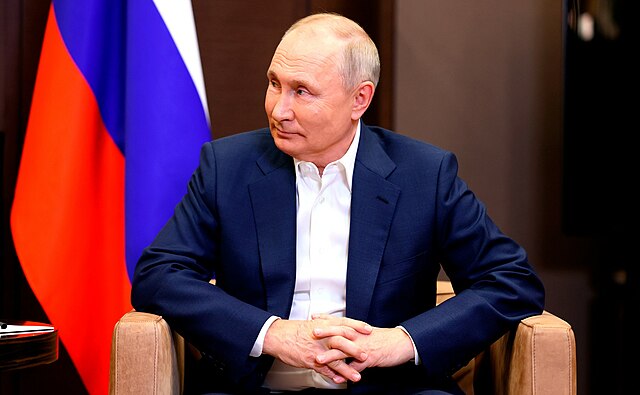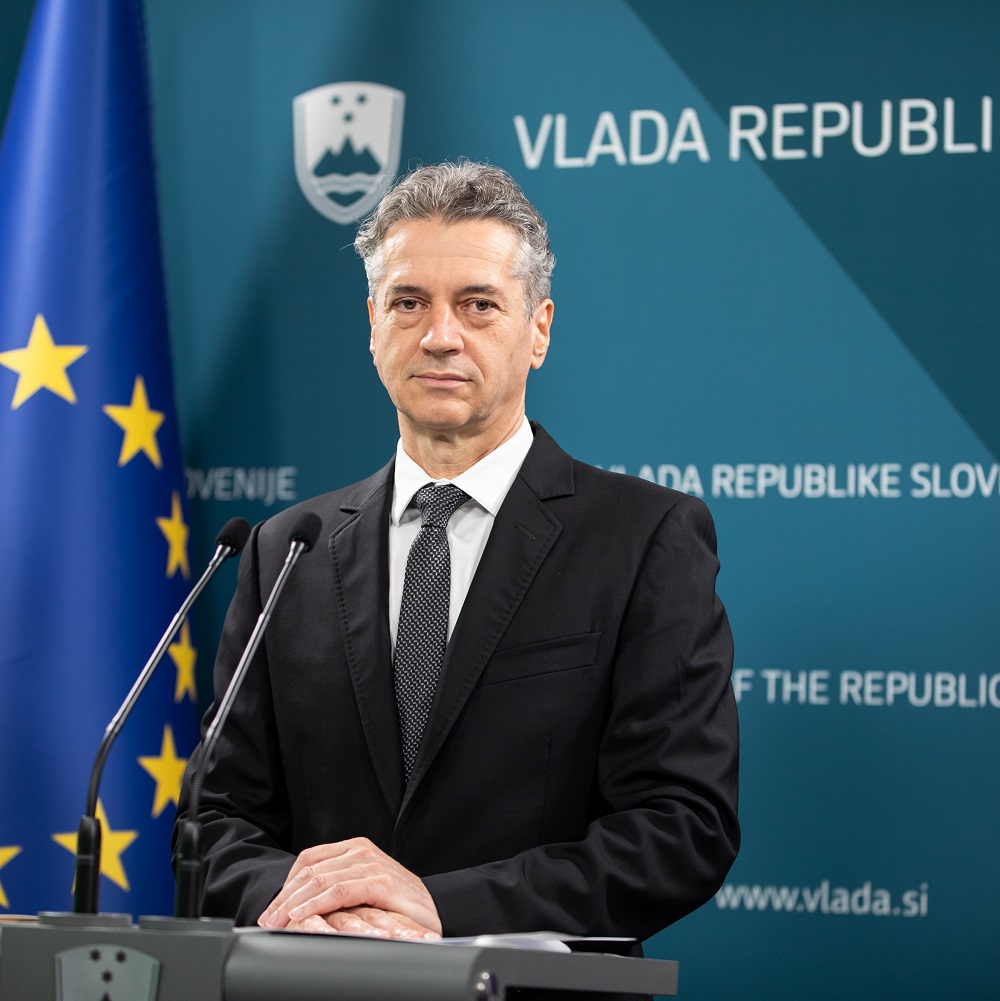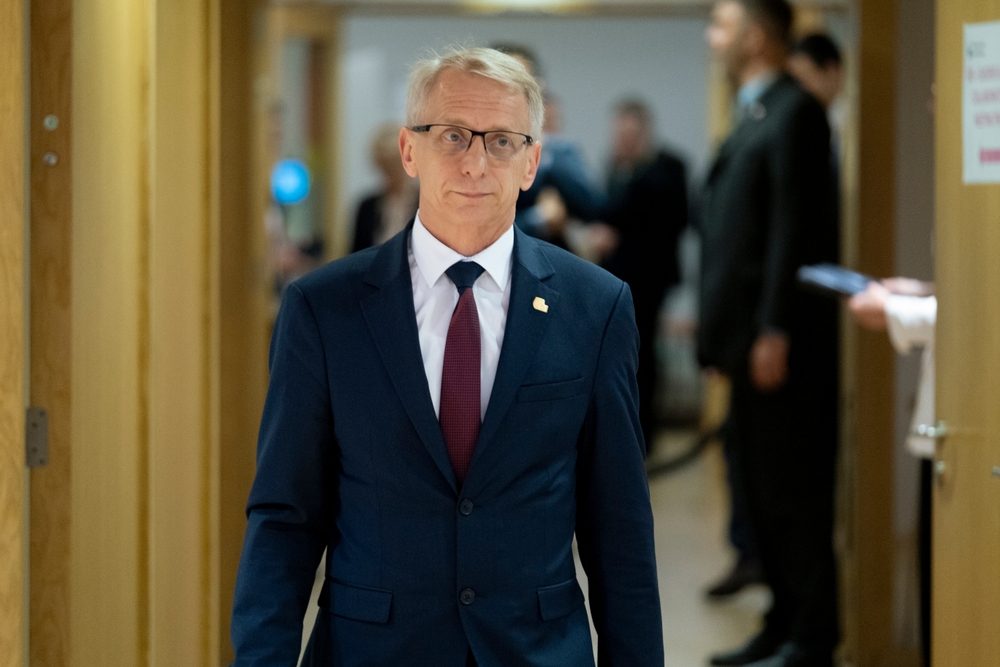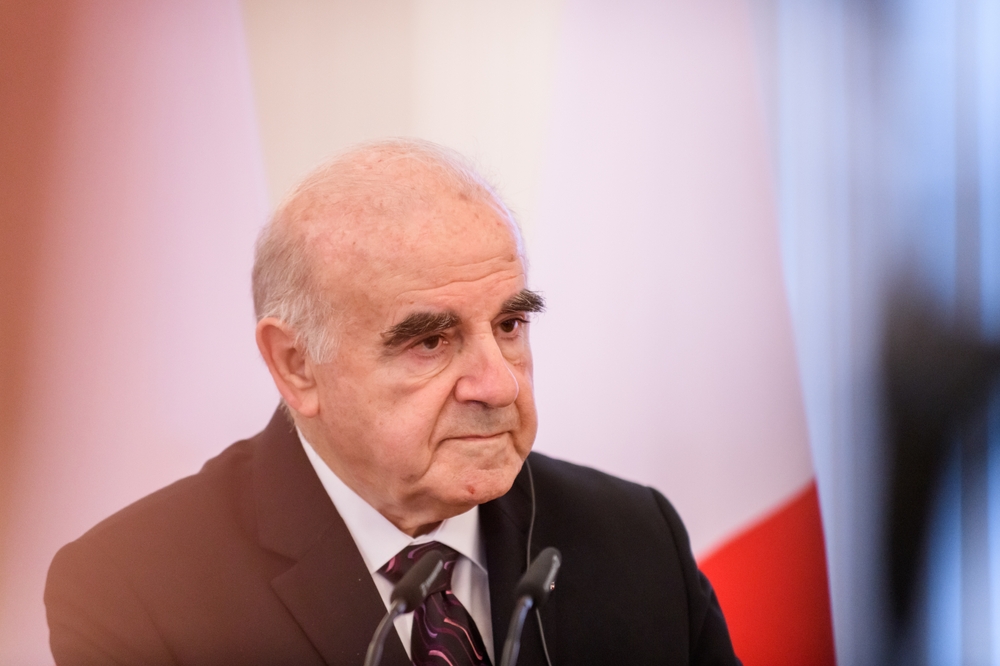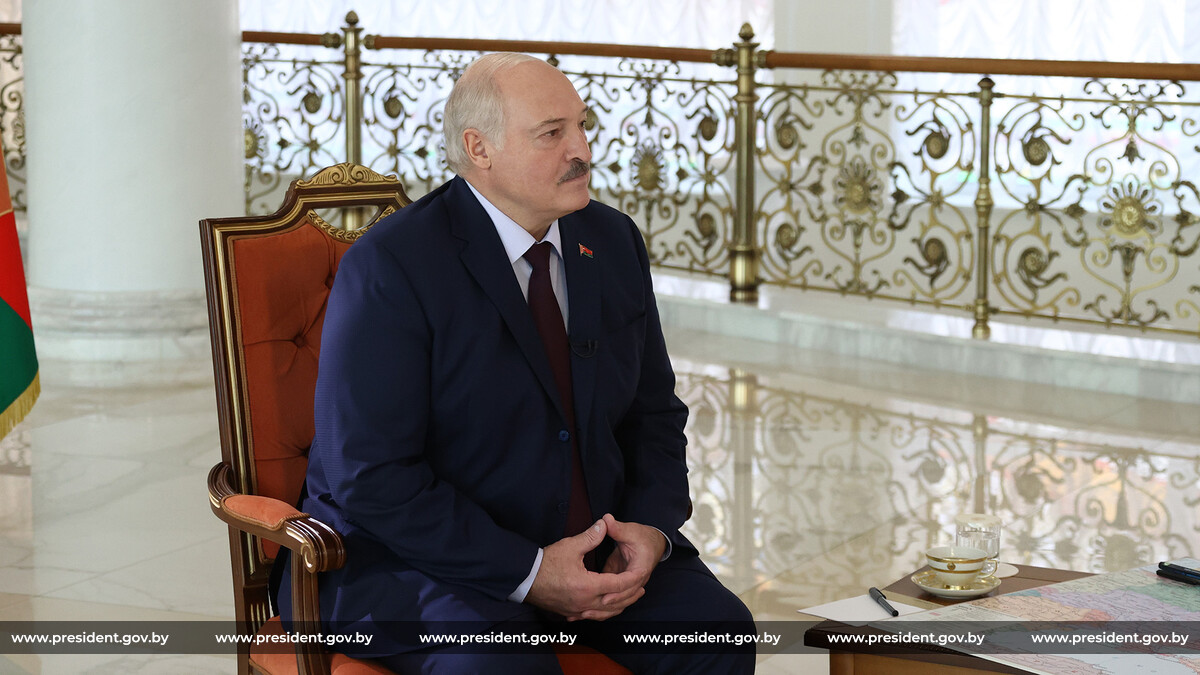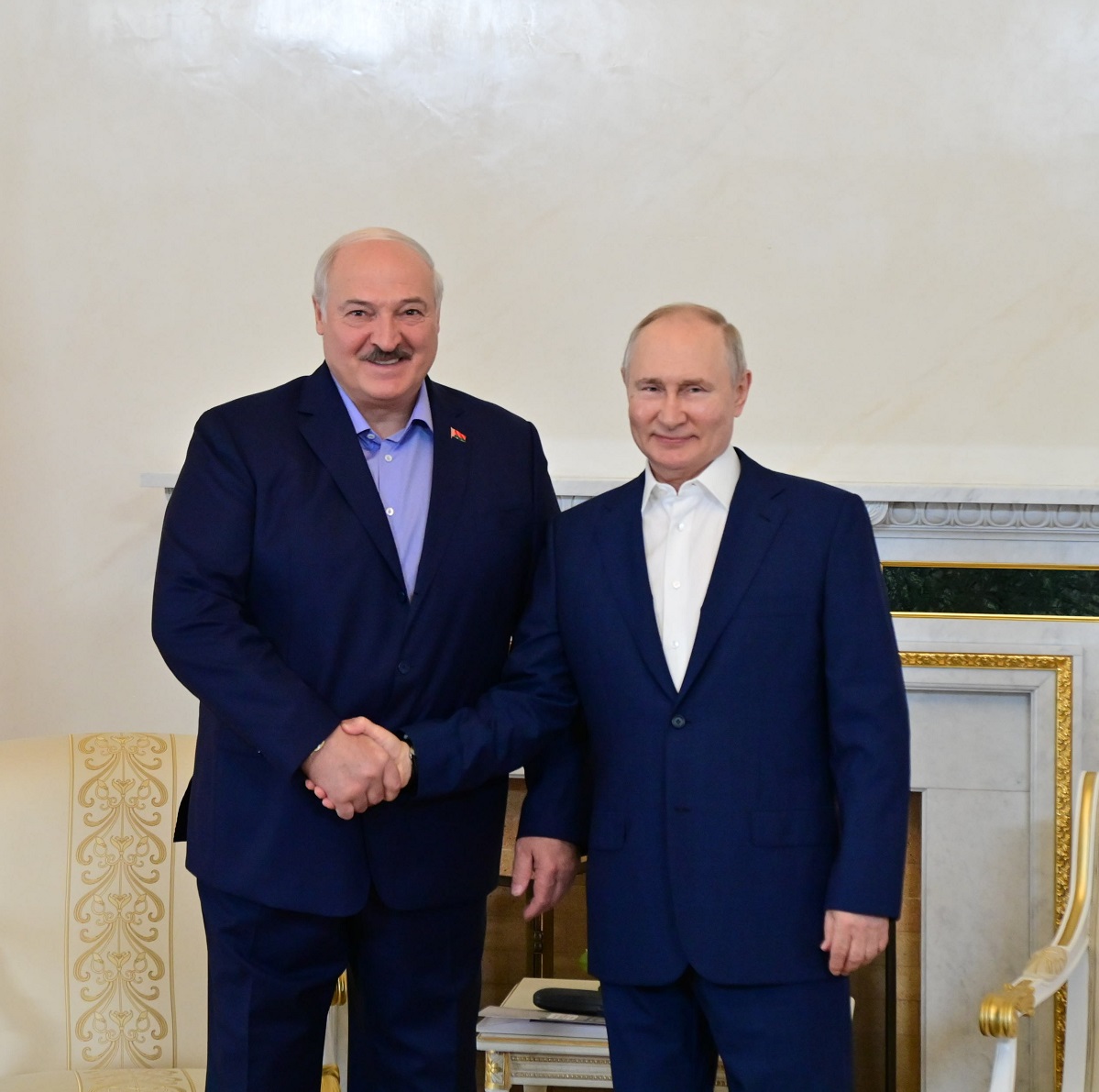Interview with Ukrainian journalist Diana Panchenko
by Aleksandr Lukashenko
Belarusian President Aleksandr Lukashenko gave an interview to Ukrainian journalist Diana Panchenko. In an interview the head of state said that the war in Ukraine was avoidable: "The war was avoidable. At any point in time. It can be stopped now and it could have been avoided then." Aleksandr Lukashenko noted that at one point he was actually at the epicenter of the events and facilitated the communication between Ukrainian President Petro Poroshenko and Russian President Vladimir Putin: "I was a liaison between Poroshenko and Putin shuttling between the two. So I was familiar with all the issues." The President recalled that the Minsk agreements envisioned to legislate a special status for certain districts of Donetsk Oblast and Lugansk Oblast and to hold local elections there: "There is something you do not know and no one does. We discussed these issues with Poroshenko, with Putin. Not three of them together, but separately. But I remember the conversation with Putin. I told him: ‘Listen, it's a good option. Why not? Gradually, over the course of a year, two or three, this territory will not be disputed and so on, as it was then. However, the then President of Ukraine, Petro Poroshenko, refused to hold the elections. "Poroshenko told me: ‘Why should I hold these elections? They will be held under the control of Russia.’ I told him: ‘Petro, well, this year, supposedly, they will be held under the control of Russia. This is something we could agree on. This is negotiable. I suggested to them: ‘I will hold elections there, I will do as you, Putin and Poroshenko, agree. And I will conduct them as you decide.’ Poroshenko refused. Putin agreed to everything," the head of state said. According to Aleksandr Lukashenko, if it had been done then, everything would have been quiet and calm. The Ukrainian hryvnia would circulate in the respective territories, and in general, the regions and the border with Russia would be under the control of Ukraine. "Donbass would have returned to Ukraine as an autonomy," Diana Panchenko said. "(Practically, yes. But he [Petro Poroshenko] was afraid that the wrong people would have been elected there," the President said. “I'm telling you frankly that there was such a conversation. Well, wrong people this year. But you would have the border there under your control. All of this would have been Ukraine. The wrong ones were elected. But it is people who vote. Next year, they will vote in the right ones. That was what we discussed. This issue must have been solved then. The Minsk agreements should have been implemented. We agreed on everything. What was needed was to comply with the Minsk agreements. But they were ignored. And, as I understand it, no one was going to comply with them. Answering the clarifying question of whether Russia was going to implement the Minsk agreements, Aleksandr Lukashenko said: "100%. You can't pin this on her. You don't have the facts for that. While there are many facts that Ukraine had not honored the Minsk agreements." In the interview, the President also answered a question regarding Russia's launch of the special military operation in February 2022. In previous statements and interviews, the head of state has repeatedly talked about how events developed, and recalled some facts. He recalled that he had recently put it “casuistically" by suggesting asking Vladimir Zelensky why Russian troops crossed the border between Belarus and Ukraine in the Chernobyl region. Aleksandr Lukashenko recalled that at that time, even before 24 February, when Russia began its military operation, the scheduled Belarusian-Russian exercises were on in Belarus. Such drills are held alternately in the two states. "We saw the situation was escalating not even on the border of Belarus and Ukraine, not even on the border of Russia and Ukraine. We saw what was happening on the borders with Poland, Lithuania and Latvia. Remember the migrant crisis, to which we had practically nothing to do," the President said. “Migrants walked in droves through the Ukrainian territory but it was not given as much importance as the situation on the border of Belarus and Poland. Remember the clashes and so on. We understood that they were starting to draw us in, to entangle us, to provoke us." "The exercise was over. Russian troops began to withdraw from the territory of Belarus. Hardware was being loaded. The troops were actually from the Far East. They were withdrawing," the head of state recalled. Belarus had always been very good in relation to Ukraine, which cannot be said about Ukraine in relation to Belarus, Aleksandr Lukashenko stressed. "We are accused of contributing to the start of the war here. No, the warfare was already underway. You started it. The Ukrainians started this warfare against Belarus. Economic warfare first of all. You have declared a blockade on us in the southern direction. You closed the sky to our planes even before the Europeans did. You did not let our goods through. You arrested thousands of wagons with mineral fertilizers that we loaded here in the port of Odessa," the President said. He also recalled the story of the Belarusian truckers captured in Ukraine, of whom several people were killed. After repeated warnings, the Belarusian side had to carry out an operation to free more than 70 people. "You didn't even notice that we got them out. You saw it only when it was shown in Minsk. We acted very carefully. We did not commit any hostile acts against you, either economic, or political, or diplomatic," Aleksandr Lukashenko said. "Why did Putin begin to withdraw troops to the Far East through Kiev? You ask Zelensky this question. He knows better. But there are reasons to accuse me of Putin going to Vladivostok through Kiev... Well, you can ask Putin," the head of state suggested. Diana Panchenko noted that she would very much like to ask Vladimir Zelensky but he is not as open to communication as the President of Belarus. "Well, he was open once, wasn’t he? Why isn’t he now? Let him answer the question to the Ukrainians. You can't reproach me for anything. There was not a single Belarusian solder there. We did not cross the border. But you did provoke us," the Belarusian leader stressed. He recalled that long before 24 February 2022, Ukraine deployed four units near the border with Belarus. They were mainly armed with Tochka-U missile systems. "We, our intelligence were tracking them. Once they came close, removed the tarpaulin - shelters from the missiles, deployed them in a combat position and turned them towards us. We had to deal with them during the Russian operation. The Russians destroyed them in the first place," Aleksandr Lukashenko said. In this regard, he asked a rhetorical question why Ukraine had to take these actions. The head of state was asked whether he and the Russian President had any disputes over Ukraine over the past year. Aleksandr Lukashenko said that they express different points of view when discussing various issues: “For example, there is a lot of talk about peace today. We voice different points of view on the issue. If there is an issue to discuss, we discuss it. It does not happen the way some people in the West try to present it. The so-called opposition says that Lukashenko does everything Putin says him to do. People who know me understand very well that this is impossible due to my character and my approach. There were times when we had argued really hard...” Diana Panchenko also asked what it cost the Belarusian President “not to recognize Crimea for eight years” although the Russian President could theoretically insist on it. “He never insisted,” the Belarusian leader replied. Aleksandr Lukashenko explained that such position was not about some benefits. “It did not give anything to us. We cooperated with Crimea and continue cooperating. They visited us, asked us for certain assistance - buses, vehicles, other things. We sold our goods to them. And the Ukrainian authorities later reproached us for selling buses there. Look, anything can be sold in our world today. But we did not hide this. Neither regarding Abkhazia nor Crimea. This is not as if I heroically stood my ground for all these eight years. It was simply unnecessary from the practical point of view,” the President said. Aleksandr Lukashenko recalled how he and Vladimir Putin were going to visit Crimea. “It was my suggestion,” the Belarusian President emphasized. “I suggested going there together. I told him that I hadn’t been to Crimea for a long time, and after all there is the Belarusian sanatorium there,” the head of state said. The President noted that he always enjoyed visiting Crimea and Ukraine, admired local beautiful landscapes and had great respect for people in Ukraine, including the western regions. In an interview Aleksandr Lukashenko admitted he loves Ukraine and its people. He reminded that he has Ukrainian roots among other ones. “It is personal. I love and loved Ukraine very much. I remember when my eldest son was still little. I got into a car and drove along the Leningrad-Odessa motorway. I went to Odessa. I stopped in fields and looked around admiring the magnificent sights. In Soviet times. I sincerely love this country and its people,” the President said. He remarked that he likes even people, who live in western Ukraine and are believed to have more nationalistic attitudes: “When I was the director of an agricultural enterprise, they would come to me every year to earn money. They needed cereals. Because growing cereals is difficult in the Carpathian Mountains. Such hardworking people! I always used them as an example. I always used my own transport to deliver two times more grain to them, to western Ukraine than what they earned.” Aleksandr Lukashenko went on saying: “The deepest respect for these people. And for western ones as well, I’ll have you know. And for Crimea. I went there. And I have always felt love for Ukraine. And I still feel exactly the same. Despite their trying to portray me as some bastard instead of Batka [father in Belarusian]. Time will come and people will sort out everything.” Aleksandr Lukashenko told the interview what Russian President Vladimir Putin thinks about the events in Ukraine and whether he is upset about them. "We touched on the situation again the last time we met (it was St. Petersburg, then Valaam). We conversed for a long time and he would say: "It's bad that we, the two peoples, clashed. You [Belarus] is involved. We are Slavic peoples!” He said thoughtfully [here’s the inside information): "No one was going to subjugate, enslave, and deprive Ukraine of independence. We didn't need it. But they should have behaved differently and should not have created problems for us," Aleksandr Lukashenko said. "I had nothing to object to him. Although we usually argue a lot. But what is there to object to that? On the contrary, I supported him," the President said. “You see, he said this out of the blue. No one was going to deprive Ukraine of independence. Why did Ukraine need to behave like it did? I saw this happen starting with Leonid Danilovich Kuchma [the second President of Ukraine]. I am a unique person. For 30 years I have seen everything that has been happening and that had to do with these events. It all began, unfortunately, with Leonid Danilovich Kuchma." The journalist asked Aleksandr Lukashenko what he thinks about the narrative promoted in Ukraine that Vladimir Putin has imperial ambitions and the allegations that he has supposedly gone mad. "No, Putin has not gone mad. With regard the imperial ambitions, I have not seen them either. But I have this idea that the leaders of large states always have this sense of confidence. That’s how I see it. This also applies to the United States of America. Isn’t it so? There's no way to measure their ambitions and the things they are doing. Russia is a huge empire, what can I say? Of course, this leaves its mark on the character of a person. But it’s all empty words, fiction that Putin has imperial ambitions. Especially now," Aleksandr Lukashenko replied. Speaking about some feelings of the Russian President, the Belarusian leader noted that no matter how close they are, Vladimir Putin is still the head of one state, and he is the head of another. "The human heart is a mystery, as our people say. I can't go into detail. But he is taking these events hard. It is not an easy situation. As a person he is absolutely sensible, experienced, analyzes everything, tries to look ahead, calculates. His life experience was such. He is practically a military man. He had a job where he had to calculate a lot in advance. He really works everything out. But he never, I'm sure, ever had these designs to go and enslave Ukraine first, then Belarus, then others. This is nonsense," the head of state said. Aleksandr Lukashenko also noted that Vladimir Putin is a very cautious person: "He never acts on a whim. He will take a step and will take a long, long time to see if it is worth taking the second step. Therefore, the assumption that he would have taken 10 steps at a time skipping) the previous nine and attack Ukraine is nonsense. He tried everything, step by step. These steps were visible." In this regard, the President recalled his conversation with Ukrainian President Vladimir Zelensky in the first days of the war. "We talked for a long time. He was huffing and puffing... I said: "You know, Volodya, we will not argue on the phone. But remember: the war is in your country. Sooner or later people will ask you why you let the war happen on your land, why you did not prevent it no matter how difficult it was," Aleksandr Lukashenko said. “The war was avoidable. I was between you and Russia all the time and saw this opportunity. The most striking illustration is the meeting of the Normandy Four. The agreement was reached. Let's implement it since we agreed. Why didn’t you?" In an interview Aleksandr Lukashenko said that he and Russian President Vladimir Putin had not discussed the possibility of such a development before the start of Russia's special military operation in Ukraine. Nevertheless, the Russian leader voiced a request to his Belarusian ally a few days prior to 24 February 2022. “You watched his speech on TV [after the start of the special military operation]. So did I. This is the first thing. We had not had any discussions prior to the start of the operation. I swear to you that we had never had any talks about Russia taking any action against Ukraine. It’s just that a few days ahead of the operation we met at his country residence to discuss the situation,” Aleksandr Lukashenko said. “He told me then (I am telling this for the first time): “Listen, Sasha, you know what the current situation is. I hope we are allies no matter what may happen”. Of course, we are allies, everyone knows about our treaties: if someone goes against Russia, we enter the war, if something like that happens to Belarus, Russia sides with us. We actually have a unified army here. So Vladimir Putin said: “If anything happens…” I asked: “Listen, what can happen?” “Well, if anything happens, watch my back, please,” he said. The Belarusian head of state recalled that in the first days of the special military operation he made a statement that Belarus was not getting involved in the conflict, as Russia was capable of dealing with everything itself. “But we will not allow shooting Russians in the back. Do you remember that phrase of mine? It had to do with Putin's request to watch their back. Most likely, he was concerned about a stab in the back from the West.” The President explained how combat operations around Kiev truly happened at the beginning of Russia’s special military operation in Ukraine in early 2022. Aleksandr Lukashenko said: “It was definitely the matter of several days. If Russians had captured Kiev, can you imagine what war it would be? The war would have ended already.” The reporter pointed out that Ukrainians believe that Volodymyr Zelensky protected Kiev and that the Ukrainian army repulsed the Russian invasion. Aleksandr Lukashenko responded by saying: “Listen, it is a fairy tale and nothing else. But all of it was probably cooked up by mass media and Zelensky himself in order to demonstrate his heroism. Once again I happened to be between Putin and some forces in Kiev, who had already agreed to ‘Hande hoch’ as Germans say. In order to survive. And I had a conversation with Putin because of it. Putin told me: ‘You know, [Kiev can be captured], it can be done right away, instantaneously but a huge number of people will die’.” The President said that the Ukrainian army had deployed not only combat tanks but multiple-launch rocket systems in the streets. And they hid behind kindergartens, schools, hospitals, and other social facilities. “He wondered how one could fight them in a military way. He said: we organize a pinpoint operation, we are on the outskirts of Kiev, we cannot fire indiscriminately like they do. In other words, he worried about having to fight in a way that would leave nothing standing at the site of this school,” he said. Aleksandr Lukashenko remarked that the Ukrainian army acted exactly the same way in Artyomovsk (Bakhmut). Fighters of the Russian private military company Wagner confirmed it. “And I had a conversation with Putin. He said: ‘How can we fire at them in Kiev if they hide behind a school and kindergartens?’ I am nearly quoting. So there were fears. A different person could have told him: ‘Listen, a war is going on. If you started a war, fight it’. And he told the truth when he said: ‘We haven’t even started yet’,” the Belarus President noted. “I am not going to dwell on reasons. You probably know that the Russian troops, who were on the outskirts of Kiev, withdrew from there. And no Zelensky repulsed anything there. Putin withdrew these troops later on. How could he [Zelensky] have defended it? Did he destroy the Russian army there? No. This is why he says he committed a heroic feat that hadn’t happened. Putin withdrew these troops from Kiev,” Aleksandr Lukashenko stressed. “He was sitting in a root cellar at that time, Diana. Your Zelensky was sitting in a root cellar back then. He didn’t fight anyone and didn’t repulse anything. But the military saw how it would end.” “I often criticize Volodya Zelensky. For his lack of experience, ostentatious behavior. He has always been like that. It played a part. Yet, as I have already said, this trouble started from Leonid Danilovich [Ukraine’s second President Leonid Kuchma]. There was no clear strategy back then; it was a back-and-forth,” the head of state said. Aleksandr Lukashenko recalled his meeting with President of Russia Boris Yeltsin and President of Ukraine Leonid Kuchma that took place after the constitutional referendum in Belarus: “Leonid Danilovich started talking about Ukraine and Yeltsin said: “Listen, Aleksandr Grigorievich, why wouldn’t you help him draft a decent constitution and hold a referendum. I said, well, to be serious, I’m ready to pitch in.” According to the Belarusian head of state, a draft constitution was developed together with Ukrainian specialists. “It was more, so to say, democratic than that of Belarus and Russia. But it was similar to ours. This constitution would have saved Ukraine from that chaos that happened later. This constitution was ready. Opinion polls suggested (we did not hide the fact that I was involved in the process) that the Ukrainians would have supported it. But time was passing by and they were kicking the can down the road,” the head of state noted. “Why so? He [Leonid Kuchma] said that the Verkhovna Rada would not pass this constitution. I objected: Listen, you haven’t even submitted it to the Verkhovna Rada yet; and indeed, will it really go against people’s will? You can hold a referendum. You can put it to vote in a referendum, get it approved and then submit to the Verkhovna Rada,” Aleksandr Lukashenko recalled. “In other words, that was one of the options. That was where it all started. Kuchma, then Yushchenko, then Yanukovich... The problems were snowballing. Finally it all descended upon Volodya Zelensky, he was not a politician, he was inexperienced, politics was simply not his thing. But he promised (even in that movie Servant of the People) to deal with oligarchs, thieves, crooks and other problems and to sort out problems around Ukraine, a very beautiful and rich country. He saw it all. He has made his bed, so now he must lie in it. He is not exactly the right man for this job,” Aleksandr Lukashenko said. “Again, Zelensky is not the only one to blame. It’s true, he was not up to the task. But was it easier for others? Was it easier for Putin when he became President? Or was it easier for Belarusians? Belarus was a basket case, we had no money, nothing. We were left in a pickle. We printed these banknotes depicting bunnies, remember?” the head of state asked. The head of state recalled how things developed in Ukraine under different Presidents. There was a chance to prevent war, but it was not used. The inexperienced Ukrainian President Vladimir Zelensky, who came to power with the support of the West and above all the United States, did not cope with the situation. "Does Russia share responsibility?" the journalist asked. “Of course. Russia is responsible for everything. For the collapse of the Soviet Union, for the then fight on a personal level. Now they say: ‘Well, the Soviet Union would have collapsed anyway. It’s good that it broke up like that, as not much blood was shed." But see how much blood we are shedding now! The wars happened along the entire perimeter. It remains to be seen how it will end. Therefore, Russia was the main state that glued, held everything together, bore responsibility as she is the successor of the Soviet Union. Of course, Russia is also to blame. We are all to blame. Russia, Belarus, Ukraine…," the Belarusian leader replied. "Poroshenko had a chance to turn everything around. Zelensky had this chance too. He was a new person, he had nothing to do with what has happened. Let’s sit down, think about what is best for your state, for your people. Why are you waging this war now?" Aleksandr Lukashenko. “A lot of people are starting to assess Zelensky in the right way. Hence this back-and-forth on his part. He cannot make up his mind whether to call the election (when are you having it - in a year or two?) or, using martial law, to postpone it. In other words, the situation is very unclear. And it is not a given that Zelensky will win this election, although you claim that he has a 90% approval rating. It is a sham. I will tell you, if the election was held in the near future, one of the military [would win]. Budanov or the like would become President. Someone from the military, but not him [not Zelensky],” Aleksandr Lukashenko said. The head of state noted that the West, primarily the United States, seeks to weaken Russia and bring it to its knees with the help of military operations in Ukraine. At the same time, the interests of Ukraine are disregarded. “After all, the best people die there. Ukraine is losing almost everything. It is not in Ukraine’s interests,” the Belarusian leader said. “Who benefits from it then? Zelensky?” the journalist asked a clarifying question. “Yes, that’s right. Ukraine is not Zelensky, and Zelensky is not Ukraine. Zelensky ... Well, listen, he is a ‘hero’. He travels around the world wearing a trident T-shirt and displays his heroism. And they in the West know how to eulogize. Remember how they went into raptures about Gorbachev: “Gorbi, Gorbi, Gorbi!” And the Soviet Union collapsed. Exactly the same is happening to him: “Ah, Zelensky! Ah, a hero!” Whose hero is he? He is their hero, not a hero of Ukrainian people,” Aleksandr Lukashenko emphasized. The head of state is sure that people in Ukraine, intoxicated by propaganda, will eventually be able to see things clearly. “It won’t go on like this forever. I am also following public opinion trends in Ukraine. Not the things that your opinion polls suggest, but what people really think. There is a growing understanding that Zelensky should find a way out of this situation, to put it mildly. People there should not die, mothers should not lose their children. It does not matter to a mother what ways and methods will be used to save her child. They should save not only their lives, but also the lives of their children. What kind of patriotism, what Motherland and so on can you talk about when your child’s life is at stake?” “Therefore, people in Ukraine are beginning to see things clearly. And millions of people who fled the country are raising their voices saying that they want to return home and asking why the war is still going on. I know for sure, they are sick and tired of your oligarchs. They want to save their billions and earn money there. But the war does not let them do it. What investments can flow in if the war is raging?” the President noted. Thus, only the United States benefits from the war. “It does not bother them that the Slavic peoples are fighting with each other, and killing each other. It is beneficial for them. Thus, having weakened Russia, they will get closer to China from this side. That’s their rationale. Zelensky is playing along. But in the end Ukraine - a flourishing, beautiful country blessed with natural resources - will cease to exist,” the Belarusian leader added. Aleksandr Lukashenko said: “Judging by all my contacts I’ve had this year (there were various contacts), I have to tell you that you shouldn’t say that the West wants [the war in Ukraine to continue]. Yes, for now they are dancing to the tune of Americans. But Western Europe is Germans, the French, and other ones. Except Englishmen of course. Those are dominated by the USA. Western Europe doesn’t need this war already. Their top people say that the war is not in America, this war is in our home.” “The war needs to stop. Europeans are absolutely intent on doing it but for now they are following orders. 15 Leopard [tanks have been given to Ukraine]. But they give military hardware unwillingly,” the Belarusian leader stated. Aleksandr Lukashenko stressed that one can no longer say that the West is cemented. “They convey these signals to your President Zelensky. Zelensky is stubborn. Why? Because his key sponsor is behind him. The United States of America. So Europe is starting drifting little by little. The public opinion in leading European countries about this war is very bad. More and more people are speaking up against it. Because they feel the damage of this war in their wallets. Americans don’t. They profiteer from it. And they support Zelensky in this regard. This is why there is no unity of Europeans and Zelensky about the continuation of this war,” the President said. In his words, once Americans want it and give this signal to Zelensky, he will start peace talks. “How can it be any other way? If there are no deliveries of weapons via Rzeszow and other border crossings, then there will be no war,” the head of state remarked. Why can the USA give this signal at some point? Aleksandr Lukashenko gave the following answer to this question: “Because they will understand that Ukraine will not win. It will lose. If Ukraine loses decisively and Russians manage to move forward, well, then the entire West will lose. This is why they need to give a signal to start negotiations when the time is right.” Aleksandr Lukashenko said: “Negotiations have to start without preliminary conditions. It is a classic move of any diplomacy. This is what I think. It is necessary to start negotiations and discuss everything. Including Crimea, Kherson, Zaporozhye, Donetsk, and Lugansk. Everything needs to be discussed there. But at a negotiation table. Sit down and work out the agenda. As it usually happens. A list of items. You can return to those items, which were worked out in the past [during previous rounds of negotiations, three of which took place in Ukraine and another one in Tьrkiye]. Then Russia was ready to discuss any matters.” The President went on saying: “Certainly, Russia will never ever return Crimea as you say. It won’t happen. I doubt for now that some agreement can be reached here, in the east. But Russia is ready to discuss any topic. I know it for sure. They are ready to talk about any topic and discuss any topic. But you [Ukrainians] are pushed by Americans and don’t want that for now. You don’t understand that there is nothing more precious than a human life. While you lose about 1,500 people in combat operations per day.” The head of state was asked whether Russian President Vladimir Putin told him under what circumstances he would consider the goals of Russia’s SMO fulfilled. "You know, we did not discuss the topic with him in this spirit, but I dare to express my position. The goals of the SMO have already been fulfilled. Ukraine will never be as aggressive towards Russia after the end of this war as it was before the war. Ukraine will be different. First, there will be people in power who are more cautious, smarter, more cunning, if you like. Intelligent people. Who will understand that the neighbors are given by God and that you need to build relations with them," the President said. "I'm sure of it. The future Ukraine will not dance to the tune of the United States. This is my understanding. I am absolutely convinced that Putin thinks so too. I think that's how he understands the process. This is a big lesson not only for Ukraine but also for Russia. For us, for the whole world. That's a great lesson. We will learn from it. Russia will too," the Belarusian leader stressed. The head of state answered the journalist's question on the thesis of ever-increasing hatred between peoples, in particular Ukrainians against Russians. “Most likely, and I am expressing my point of view, all this was seen differently before. Today we have wised up, drawing lessons from these events. Yes, it is true and everything you said appears to be the case. We have angered nations against each other. Moreover, the position of Ukrainians and Russians seems irreconcilable to us. Belarusians are also involved in this,” the head of state said. Aleksandr Lukashenko noted that in this regard he always cites the example of atrocities committed by the Nazis during the Great Patriotic War. “The wounds have healed. The Soviet Union had good relations with Germany. Both Ukraine and Belarus, which was practically wiped off the face of the earth, built relations with Germany. Why shouldn’t we build relations with Ukraine? We will,” the Belarusian leader emphasized. “If we talk about it and do not act, we are unlikely to achieve anything. We have to act. The first step is to sit down at the negotiating table. Well, we may spend the first day looking at each other with hatred. But then we will start talking. Things went the same way in Gomel, in Belovezhskaya Pushcha, in Istanbul [the rounds of Russian-Ukrainian negotiations in 2022]. That is how it was. It started with everybody arguing bitterly. And then they started discussing specific issues. But the United States told Vladimir Zelensky to stop negotiations and continue the war, the President said. The President is sure that only at the negotiating table it is possible to find a solution to the situation, and it should be done with the participation of all the stakeholders and the world’s powers. “It should not be like it was in Saudi Arabia [ the negotiations on a peaceful settlement in Ukraine, which took place in early August 2023 with the participation of a number of countries]. Russia was not there. What kind of negotiations are these? What did you decide to negotiate without the presence of all the parties involved in the conflict? I mean that those who feel that they should be at the negotiating table, should be there,” Aleksandr Lukashenko said. In June 2023 Secretary of the National Security and Defense Council of Ukraine Oleksiy Danilov said that the talks were in the pipeline and pointed to Belarus’ possible participation in the negotiation process. “Is it some sort of a veiled invitation to you to join the talks if they take place?” the journalist asked the head of state. “You should address this question to Danilov,” Aleksandr Lukashenko said. The President added that he had heard the statement. “We border on Ukraine. We are ‘co-aggressors’ as your country and the West call us. Of course, we have our interests there, and our position should be heard. I believe that Belarus should be involved in the negotiation process (the level of its involvement is not discussed today),” the head of state said. In his words, Belarus’ participation in the peace talks will bring positive results. “I think our participation is quite possible,” the President said. In an interview with Diana Panchenko Aleksandr Lukashenko talked about contacts of the Belarusian side with Ukraine’s special services and about the topics raised during these negotiations. Aleksandr Lukashenko noted: “As for whether negotiations are in progress or not. They certainly are. We’ve met with representatives of your authorities about five times probably.” “When was the last time?” Diana Panchenko asked for clarification. “The last time was several months ago. These negotiations were initiated by the GUR [Central Intelligence Office of the Ukrainian Defense Ministry]. They focused on whether Belarus will join the war in the future, whether Belarus will fight or not on the side of Russia in the north. And many other matters,” the President noted. He also remarked that the Ukrainian side has been recently interested in matters concerning the potential use of nuclear weapons and the deployment of the private military company (PMC) Wagner in Belarus. “These questions accumulated. But we had these contacts and we talked. We don’t mind. Proposals have been put forward now: ‘Let’s meet in Istanbul or the Emirates’. I said: ‘Guys, are you crazy? We are just over the border from you. Feel free to come to Brest or anywhere you like. To Gomel, Mozyr, any place. To Minsk. And we will organize a conversation with you. Why do you suggest that we should go somewhere, to Turkiye or the Emirates?’ These are good countries. We don’t mid. But we can have negotiations here,” Aleksandr Lukashenko stressed. “Then Zelensky noticed some threat to those, who were organizing these negotiations (so-called political competition). He forbade them to have this dialogue. We know via intelligence agencies, special services, including military ones, they conduct these negotiations with Russians in Ukraine. And positions are explained. Russia’s to Ukraine and Ukraine’s to Russia. Ukrainians have contacts with us and contacts with them, with Russia. A foundation for these negotiations is available. Let’s talk. But your politicians will get themselves in trouble. Not Putin, not Russia but Ukraine’s military will overthrow this political elite led by Zelensky. You’ll see. Because the military see the futility of what is going on there,” Aleksandr Lukashenko stated. The journalist asked the head of state what can force Belarus to get fully involved in the war in Ukraine. “If you, Ukrainians, do not cross our border, we will never get involved in this war. In this hot war. Yet, we will keep helping Russia - they are our ally. You know that 55 countries are helping you with coordination, training, ammunition, weapons, and so on. And only Belarus is openly helping Russia,” Aleksandr Lukashenko replied. Diana Panchenko, in turn, noted that they often say in Ukraine that Vladimir Putin is pushing the President of Belarus to get involved in the war. “It’s complete nonsense. Do you know why? Because it makes no sense. An additional 70,000 troops will change nothing,” the head of state emphasized. “They have enough manpower and firepower. Therefore, getting Belarus involved... How will it help them? You tell me what is the point of us joining the fight against Ukraine? There is no point.” Diana Panchenko recalled the recent statement by the head of state regarding possible plans for Ukraine’s admission to NATO in separate parts and the transfer of some of its territory to Poland. “Will Western Ukraine become part of Poland?” the journalist asked the President. “I don’t think so. I think that Ukrainians themselves will not let it happen. Zelensky is moving towards this: you have taken some decision to give Polish police officers or civil servants nearly the same rights as Ukrainian ones have,” Aleksandr Lukashenko said. “Such narratives are circulating in the media landscape to prepare people for this,” Diana Panchenko noted. “Yes, that’s what I hear. Moreover, units have already been formed in Poland - a military unit to help Ukraine. If they come in, they will not go away, because Americans are standing behind Poland. Well, this will be Polish territory. Why would NATO not accept them in this case? It will already be Polish territory. They will use this as an argument. Therefore, everything is being prepared for this. And you, journalists, were the first to speak up about it. You said what we, politicians, had just started to see. Therefore, such preparations are underway. This is unacceptable for us and for Russians. It is necessary to preserve Ukraine’s integrity, so that the country will not be sliced up and divided by other countries. Negotiations come next. You see, that’s what should be done first. You, Ukrainians, need it,” the head of state emphasized. “We do. We need peace, everyone needs peace,” the journalist agreed. Aleksandr Lukashenko said: “There can be only one threat: aggression against our country. If aggression against our country is launched from the side of Poland, Lithuania, Latvia, we will immediately respond with everything we have. You see we have something. And the strike will be unacceptable. We don’t compete with them. NATO stands behind Poland, Lithuania, Latvia. We certainly understand that the forces are incomparable. But we will deliver an unacceptable strike against them and they will receive unacceptable harm, damage. It is what our security concept is based on.” The President went on saying: “The nuclear weapons deployed in Belarus will definitely not be used unless we face aggression. If only an act of aggression is committed against us, an attack against Belarus, we will not tarry, wait, and the rest. We will use the entire arsenal of our weapons for deterrence. Why? Belarus is not Russia. Belarus cannot observe and wait for something. There is a great distance between Brest and Vladivostok but our territory can be captured within a month and there will be nothing left. This is why we will not tarry and watch. Once aggression is committed against us, we will follow the plan. I have publicly approved the plans but, of course, I haven’t revealed their content. We will respond with everything we have. And we didn’t bring nuclear weapons here in order to scare someone. Yes, nuclear weapons represent a strong deterring factor. But these are tactical nuclear weapons, not strategic ones. This is why we will use them immediately once aggression is launched against us.” Yet Aleksandr Lukashenko pointed out that Belarusians are not crazy and would not like to use nuclear weapons. If no aggression is committed against Belarus, nuclear weapons will never be used. “Can the nuclear weapons be used against Ukraine under these conditions?” the reporter asked for clarification. “Not only the nuclear weapons [will be used] against Ukraine if it commits aggression against us. We have something else in addition to the nuclear weapons. And we will not warn you that we will deliver a strike on decision-making centers once you cross red lines. It will be done without a warning. This is why leave us alone. We leave you alone and you should leave us alone. I mean Ukraine least of all. I mean primarily those crazies in the West, who are already making preparations,” Aleksandr Lukashenko noted. According to the head of state, the events in Ukraine have taught people a lesson and have shown that a clash of military blocs should be avoided. “Ukraine is showing that this is a terrible thing. And NATO’s war with Russia and Belarus would mean a world war involving nuclear weapons. It would be much worse than in Ukraine. Therefore, this must be averted. I know for sure that the West does not want a nuclear war indeed. Because no one will be able to survive in this war: Russia has the world’s biggest stocks of nuclear warheads, the United States of America has about the same. It will be an all-embracing war that will not spare anyone. No one wants to die, everyone wants to live at least the way we live now, and hope for the best. Even now, I do not see any reasons for such a war to begin,” Aleksandr Lukashenko said. Diana Panchenko said that the idea that the Russian government is weak after events involving PMC Wagner is being actively promoted in Ukraine. “I quote: Putin is no longer the person we used to know. There is another version claiming that all of it was staged. A performance designed to reveal traitors and give reasons to move PMC Wagner to Belarus for the sake of a consequent march on Kiev. What out of it is true?” the reporter wondered. “First things first. As for Putin is no longer the person we used to know. Putin is absolutely not the person we used to know. His personal traits have been multiplied. Recent times have taught a lot to everyone, including to Putin. He is no longer his old self. He is now wiser and more cunning, I’ll have you know. If someone thinks that Putin has been weakened by Prigozhin’s mutiny, it is total nonsense. Putin is now more mobilized, more cunning, and wiser. Our adversaries need to know it,” Aleksandr Lukashenko said. Speaking about claims that the mutiny was staged, the President stated that only crazy people can call it that because the event did colossal damage. “This narrative appeared right away. But it is not promoted anywhere except for Ukraine. It was not staged at all,” he remarked. Aleksandr Lukashenko noted that the initiative to deploy PMC Wagner in Belarus had been his. It had not come from Russia’s leadership or anyone else. The possibility was discussed and decided on during negotiations with Yevgeny Prigozhin as one of the security guarantees. “It was my proposal. In order to quell this munity, to put out this fire, it was necessary to accept any conditions because the mutiny could have been devastating to everyone. You say that the West and Americans may have felt joy about this mutiny at first. But later on they came to their senses and say now: ‘Thank god, this variant didn’t come to be.’ Why? Because they were concerned about nuclear weapons most of all. Who will possess nuclear weapons? PMC Wagner? Yevgeny Prigozhin? Things could have been terrible. This is why even the most vicious enemies of ours didn’t want this turn of events and this mutiny,” he noted. Aleksandr Lukashenko believes that similar mutinies are unlikely to happen in Russia in the foreseeable future. “Russia could have quelled this so-called mutiny. At the cost of a lot of blood. But I think it could have handled it. Right up to removing army units from the front. But it would have handled it. But this very march indicates that it is impossible and unnecessary. Frankly speaking, the next mutineers will be afraid to make such attempts after they draw conclusions from this mutiny,” the President said. “As for Putin’s overthrow that Zelensky and his supporters desire, they may try. Let them try. If they don’t have enough problems as it is, they will get even more problems. Nobody will overthrow Putin today,” the Belarusian leader stressed. According to the journalist, Vladimir Zelensky was very upset by the deterioration of relations with Aleksandr Lukashenko. “He took it hard, despite the fact that Ukraine introduced sanctions faster than the EU, as you said then. Is there anything you want to tell him?” she asked. “I can tell him only one thing today. I would say to him: Volodya, the war is going on in your country, on your land. You must do everything to prevent things from getting worse. Yes, whatever happened, happened. Those who are to blame will have to face the music. But this should be stopped now. The developments should not take a further turn for the worse. It will be worse, first of all, for Ukraine. This is the only thing I want to say to him today. I want him to hear it. And that’s something to begin with,” the Belarusian leader replied. In an interview Aleksandr Lukashenko said that he has not yet decided whether he will run for President in the next election. “I haven't made any decisions yet, honestly. Perhaps it may look like some kind of couldn’t-care-less attitude on my part, but I have so many issues to solve right now. As soon as the time comes to make a decision, I will do it. Right now, I need to make sure the country holds out in the current situation, does not get involved in a mess, as people say. I have to guide my people on this very thin, fragile ice, so that we don’t fall through. This is the most important thing for me now. Both my future and the future of the next government depend on this. This is what I am doing right now. Honestly, I have not thought about it, and even in my family circle we have not discussed this topic. It is not the time to think about it,” Aleksandr Lukashenko said. During the interview Diana Panchenko shared her impressions of Minsk. She said that she liked the atmosphere of order and security in the city. She expressed her hope that Belarusians understood the main value and their main resource - peace. “I have a question (and maybe you have an answer): what will happen to all this without Lukashenko?” Diana Panchenko asked. Very soon the country will have elections to the parliament and the Belarusian People's Congress. The President said he would do everything to help Belarusians determine their future. “I will be persuading my people. I will be telling my people the truth. Our people themselves understand what can happen. They understand that we can lose this island of peace and tranquility,” he said. “Every time I come to Minsk, I see well-maintained streets and perfect roads. Walking around Minsk I sometimes get the impression of being in Kiev, the one it could have been and the one it once used to be. Although the cities may not be alike, but the feeling is exactly the same,” Diana Panchenko said. “Putting it simply, what and when did we do wrong?” “Things went wrong when you started plundering Ukraine. If you want to preserve the integrity of the country, there must be unity, there must be a core. First of all, a state one, like we have. We are always criticized for this vertical of power, ‘dictatorship’ and so on. But it is precisely this and, as you call it, dictatorship, discipline, and order that contributed to the consolidation of the entire nation. We managed to explain everything to our people, to tell them what should be done, including today. I often say: if you do not want to fight like Ukraine, let us work hard in the fields. People hear me,” Aleksandr Lukashenko said. Ukraine started to fall apart when oligarchs began getting the best pieces, the President said. According to him, this created numerous centers of power, including those supported by security and law enforcement agencies. It was difficult for the government to resist it. “Ukraine ended up divided. You began to play in democracy, elect all kinds of people, re-elect. You eroded the responsibility by such actions of yours. Everything however started with your thoughtless privatization. You dismantled Ukraine and hurt people. Ukrainians were terribly dissatisfied with that situation. Everything started from there. The economy was the backbone for everything,” the head of state is convinced. “You have destroyed the richest, most beautiful country.” Then the oligarchs went into politics and brought certain people to the country’s highest posts. “When a politician has a lot of money in his pocket, he is not independent,” the Belarusian leader said. “Haven’t you ever thought of buying a yacht and going to Monaco?” the journalist asked. “I have never had such thoughts. I am not that kind of person at all. A yacht, the heat, the sun – it is not my thing. It’s better to go to the mountains in winter. There is no better place than Sochi. We have a governmental base, a hotel there. I don't need anything else,” Aleksandr Lukashenko said. “I hate money, as I grew up in a poor family and always lacked it. I am a different person by nature. I can find my happiness at home, in Belarus.” Aleksandr Lukashenko said he believes that Vladimir Putin will be reelected as Russia’s President: “I think that Putin will be Russia’s next President. The election will be held in six months. No one can challenge Putin now”. The journalist quoted the head of state who said in a 2020 interview that Vladimir Putin would step down before 2036 and those who would take over his role would continue Russia’s development course. “Do you think there is such a person?” the journalist asked. “I think so. And I believe that if Putin does not see this person now, he will find this person in the near future,” the Belarusian leader is convinced. At the same time, the President of Belarus believes that Vladimir Putin is not focused on this matter now, because he has so many issues to deal with. “The country is big, there are many other problems that need to be addressed,” Aleksandr Lukashenko explained. During the interview, Diana Panchenko noted that today Ukrainians blame the Russians for all their troubles. In her opinion, Ukraine was made a "country of hatred" long before the events of 2022. "They did it deliberately. It was a public policy. How can we make sure that this does not happen to Belarusians?" she asked the head of state. The President believes that it is important to fight the information space as hard as possible. "We fight on this battlefield as hard as we can. You know, I won't say that we are winning but we are not losing yet, because, probably, the truth always wins after all. If you tell lies, then you won't win," Aleksandr Lukashenko said. "If we analyze everything that has happened between our peoples, between our countries in recent years, then we see that they worked persistently, methodically to make sure that Ukrainians learn less and less about Belarusians, about Russians and vice versa. It turns out that people who once lived in the same country know absolutely nothing about each other today. For example, many Ukrainians are sure that every Russian, waking up, thinks about how to kill as many Ukrainians as possible. Don't you think that today exactly the same process is taking place in relation to Russia and Belarus on the one hand and Europe on the other? Aren't they preparing us just as systematically for something big and terrible?" the journalist said. The President did not rule out that this is possible: "If you conquer other people's minds, then you will win any war in the future. Therefore, they might be preparing for this by waging this war on our minds. But it is the job of any government to counteract this, no matter how difficult it is, no matter how unequal the forces are. But it's better to fight like this than with missiles." "It is difficult to fight this information war but we must. Otherwise, we will have to fight the way Russia and Ukraine are doing. Therefore, we are trying, resisting, doing everything possible," the head of state added. “Tactic is to reach every person, reach out to them, and talk to them. This is the most important area of our work. People will appreciate it. In particular, I try to meet with people, talk to them, to explain things." In an interview Aleksandr Lukashenko said that Ukraine's first step towards the country's recovery should be a step towards peace. “There should be a step towards peace. Yes, you can fight for these territories. I am not saying that they should be left behind. A different tactic should be chosen however: while fighting for these territories, you may lose others,” Aleksandr Lukashenko said. The President is convinced that Ukraine will definitely recover: “It is a great country, with hardworking people. I often say to some of my colleagues to go and learn from the Ukrainians. The country has rich traditions. All this must be restored today. A lot must be done and they need to start. Ukraine will be Ukraine. The country cannot be poor on such a land, but they must take the first steps. And the first step should be the one to stop the war.” “The war must be stopped. When a war is raging, when you are distracted, when so many people are dying, your relatives, loved ones, what can you think about? What wealth can you think about? What kind of housing to build? Or maybe how to take care of your land plot? What can you think about when you know that tomorrow you can be grabbed in the street and sent to the front? You will only think about the ways to avoid that fate. Only those who can pay their way out of the military enlistment office do not fight in your country. Everything can be settled with the help of money in your country. It is awful. You need to restore order in your country,” the head of state emphasized. He believes that Ukraine needs to rebuild life from the very bottom, with the main principle - fair treatment of a person – to be at the core. “You need to rebuild your economy. But first you need to provide your people with food and clothes. It is that where we started in 1991. Our economy stalled then. We worked hard to save jobs, and we saved these enterprises. Ukraine needs to go through this now. Ukraine can do this. It has a much better location than Belarus in terms of natural resources and climatic conditions. The country can do this even in these difficult conditions. But they need to make the first step, and the first step is peace,” the Belarusian leader said.
